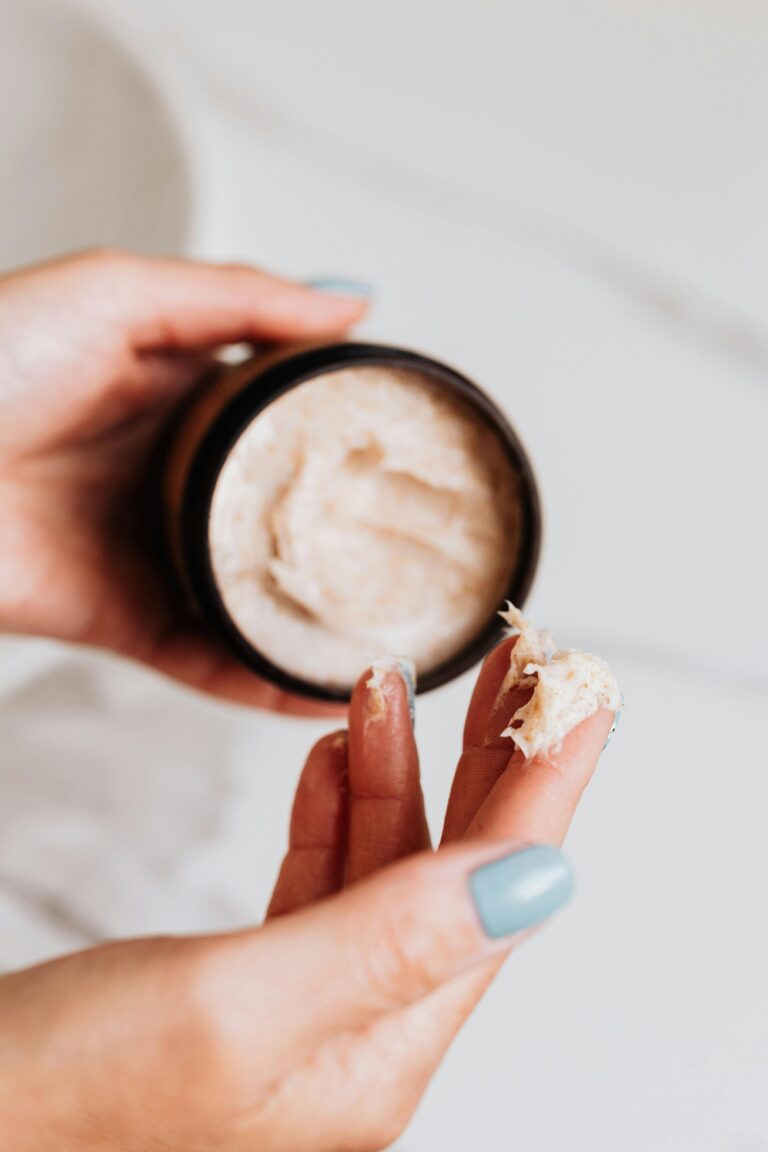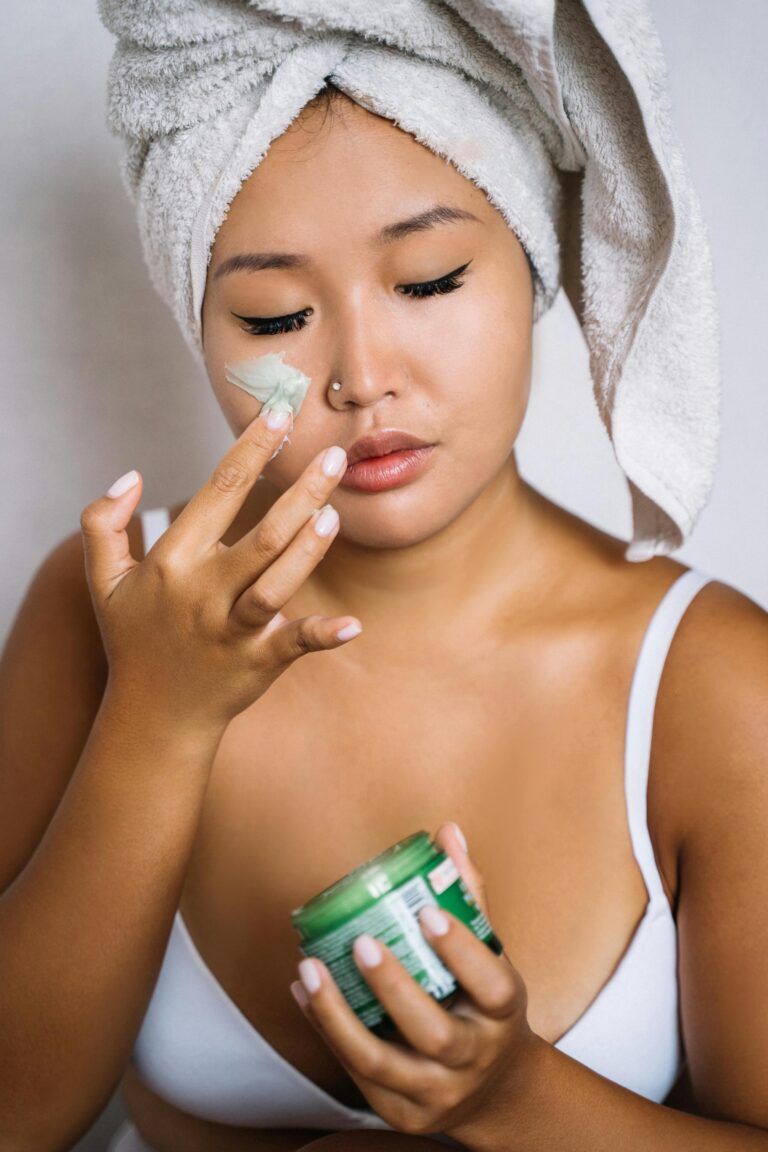What Is My Skin Type? Learn To Treat Your Skin Correctly
Ever wondered why some skincare products work wonders for others but leave your skin feeling less than fabulous? Understanding your skin type is the key to revealing a routine that truly works for you.
Your skin’s behavior—whether it’s oily, dry, sensitive, or a mix—depends on factors like hydration, natural oil production, and sensitivity to the environment.
What is my skin type is a valid question! I have been struggling with this question myself for years. It’s not always easy to immediately see what your skin type is because, besides very dry skin and very oily skin, there is more in between as well.
In today’s blog post, I’m going to share my tips to help you with determining your skin type.
What Is My Skin Type?
Your skin type is the unique blueprint of how your skin behaves, looks, and feels. It’s categorized based on factors like oil production, hydration, and sensitivity.
The main skin types are oily, dry, normal, combination, and sensitive[1], though you might notice your skin falls into more than one category or shifts with the seasons. Understanding your type is the first step to crafting a skincare routine that truly works for you.
But remeber, your skin type isn’t static—it can change over time. Age, hormonal shifts, and even your environment all play a role. For example, moving to a humid city might make your skin oilier, while cooler weather could emphasize dryness. Hormonal changes like pregnancy or menopause can shift your skin’s needs as well.
Identifying your skin type helps you create a game plan that’s tailored to you. It’s about giving your skin what it thrives on, from hydrating products for dryness to oil-controlling solutions for shine or calming treatments for sensitive skin.

The 5 Basic Skin Types
Knowing your skin type is a game-changer when it comes to skincare. It’s like having the blueprint to unlock healthy, glowing skin. Here’s a breakdown of the five main skin types to help you spot the telltale signs and give your skin exactly what it craves.
Dry Skin
Dry skin often feels tight and looks dull due to a lack of natural oil (sebum). If this sounds familiar, you might notice flaky patches, redness, or even rough texture, especially in colder months.
Your pores may be almost invisible, and fine lines can show up more easily due to dehydration. Factors like hot showers and harsh cleansers can strip your skin further, making dryness worse.
Stick to creamy cleansers, hydrating serums with hyaluronic acid, and nourishing moisturizers to give your skin that extra love. Avoid overly drying products or skipping moisturizer.
Oily Skin
Oily skin tends to shine—literally—thanks to an overproduction of sebum. The T-zone (forehead, nose, and chin) is usually greasier and more prone to clogged pores, blackheads, and breakouts.
Enlarged pores are another hallmark of this type. While it might feel like a battle, there’s a silver lining: oily skin often ages slower and naturally stays more hydrated.
Stick with lightweight, oil-free products that hydrate without clogging pores. Exfoliate regularly to keep your skin feeling fresh, but don’t overdo it—your skin barrier is important.
Combination Skin
Combination skin is tricky to pin down because it’s a mix of both oily and dry zones. Most commonly, your T-zone might be oily, while your cheeks feel dry or normal.
It may take trial and error to find balance, but multitasking is key. Reach for gel cleansers that don’t strip your skin, and layer hydration where it’s needed most.
Spot-treat problem areas with targeted products, like mattifying treatments for oily zones and rich creams for drier patches. Don’t be afraid to mix and match.
Normal Skin
Lucky you if you’ve got normal skin—it’s the least complicated type. Your skin feels balanced, isn’t too oily or too dry, and reacts well to most products. Pores are small, and it’s not prone to breakouts or redness.
While it sounds low-maintenance, normal skin also benefits from a consistent skincare routine. Stick to gentle cleansers, hydrating moisturizers, and sunscreen to maintain that natural glow. Even if your skin seems effortless, giving it proper care prevents future issues.
Sensitive Skin
Sensitive skin often feels like it’s on high alert, reacting to products or environmental changes with redness, itchiness, or irritation. It can appear dry, oily, or a mix of both, but sensitivity is its defining feature.
Fragrances, harsh ingredients, and extreme weather are common triggers. Keep things simple with soothing, fragrance-free products packed with calming ingredients like aloe vera or ceramides.
Patch-test new products first to avoid flare-ups. Treat your skin gently—it deserves the extra care.
How To Identify Your Skin Type
Discovering your skin type is like revealing the first step to your perfect skincare routine. It’s not about guessing—it’s about observing and understanding what your skin truly needs. Here are two simple, foolproof methods to help you figure it out.
The Bare-Face Method
This method lets your skin reveal its natural tendencies without any interference. Start by washing your face with a gentle cleanser to remove all makeup, dirt, and oils.
Pat it dry, and for the next hour, resist the urge to use any moisturizer, toner, or other products. Let your skin breathe.
After an hour, check how your face feels and looks. Does your skin feel tight and look flaky or rough? You might have dry skin. If there’s oil visible across your T-zone (forehead, nose, and chin), your skin could be oily.
If the oiliness is only in your T-zone and the rest of your face feels normal or dry, you might have combination skin. If your skin feels balanced and comfortable without any noticeable dryness or oil, you likely have normal skin. If you notice redness, itchiness, or sensitivity, your skin might fall into the sensitive category.
This test works best when done in the morning after you wake up or as a reset after removing all products from your skin the previous evening.
The Blotting Sheet Method
This quick method is ideal if you’re short on time but still want accurate results. All you need is a clean blotting sheet (or tissue in a pinch).
Gently press the sheet onto different areas of your face, including your forehead, nose, cheeks, and chin. Look at the sheet after each press to see where oil transferred and how much.
If the sheet picks up a significant amount of oil from all areas, your skin type is oily. If there’s little to no oil across your face, it’s likely dry. If there’s some oil on your T-zone but not the cheeks, your skin might be combination.
A consistent, moderate amount of oil suggests your skin is normal. If your skin feels tender or looks red during the process, it could indicate sensitivity.
This method works well in the middle of the day or a few hours after you’ve cleaned your face. Skin behavior varies throughout the day, and this timing gives a clear picture.
I’ve found a couple of tests on the internet which can help you determine your skin type. I would recommend trying the Skin Type Quiz by Renée Rouleau, which you can find here. You can obviously browse the internet as well to find some other skin type tests.

Tips For Caring For Each Skin Type
Your skin is as unique as you are, and giving it the right care starts with understanding its needs. Whether your skin feels tight, gets shiny halfway through the day, or struggles with sensitivity, these tailored tips will help you show your skin some love.
Dry Skin Care Tips
Dry skin often feels tight, flaky, or rough and benefits from an ultra-nourishing approach. Stick to gentle, hydrating cleansers that won’t strip your natural oils.
Look for ingredients like hyaluronic acid, glycerin, and ceramides in your moisturizer to lock in hydration. Creamy, richer formulas tend to work best.
After cleansing, apply moisturizer while your skin is still slightly damp to seal in the moisture. Skip products with harsh alcohols or fragrances, as these can worsen dryness.
Limit exfoliation to once a week, opting for mild, non-abrasive exfoliants, and avoid hot showers, which can dehydrate your skin further.
Keeping a humidifier in your space can also do wonders for maintaining skin hydration, especially in dry climates or during winter months.
Oily Skin Care Tips
Oily skin often comes with a shiny T-zone, persistent blemishes, or enlarged pores, which need lightweight and balancing care.
Use a foaming or gel cleanser that removes excess sebum without stripping your moisture barrier. Oil-free and non-comedogenic products are your best friends to prevent clogged pores.
Hydration is still important—don’t skip moisturizer thinking it’ll reduce oiliness! Instead, opt for a light, water-based gel that hydrates without adding grease.
Incorporate gentle exfoliation 2-3 times a week to keep pores clear and blemishes at bay. Salicylic acid and niacinamide are powerful allies for oily skin, as they help regulate oil production and refine texture.
For midday shine, keep blotting papers or a mattifying powder handy for touch-ups.
Combination Skin Care Tips
With combination skin, you’re likely dealing with oily areas (usually the T-zone) and dry zones elsewhere. A tailored skincare approach is key. Use a mild, gel-based cleanser for a balanced cleanse.
You might even benefit from multi-masking—applying a hydrating mask to dry areas and a purifying clay mask to oily areas can target both concerns effectively.
Stick to lightweight moisturizers that hydrate without clogging. If certain parts of your face seem oilier, apply mattifying products there while focusing rich creams on your dry patches.
Look for balancing ingredients like niacinamide, which works well for all areas of your face.
Normal Skin Care Tips
If you’re lucky enough to have normal skin, maintenance is your main goal. Your skin doesn’t need heavy-duty troubleshooting, but a consistent routine keeps it healthy and glowing.
Choose gentle cleansers that maintain your skin’s natural balance. SPF is essential—every. single. day.
Use lightweight moisturizers with antioxidants like vitamin C to protect your skin from environmental damage. Include gentle exfoliation once or twice a week to keep your skin smooth and radiant.
Even with normal skin, changes in weather or stress can throw things off balance, so pay attention to what your skin tells you.
Sensitive Skin Care Tips
Sensitive skin can be reactive, which means you need ultra-gentle products and a close eye on ingredients. Look for fragrance-free cleansers and moisturizers with soothing agents like aloe, chamomile, or colloidal oatmeal. When testing new products, always do a patch test first.
Avoid harsh exfoliators and instead gently remove dead skin cells with calming chemical exfoliants like lactic acid at low doses. Say no to sulfates and alcohols—these are common irritants.
Protect your skin with SPF mineral-based formulas containing zinc oxide or titanium dioxide, which are less likely to trigger sensitivity. Keep your skincare minimalistic and simple for a calm, happy complexion.
Each skin type has unique needs, and finding a routine that works for your skin can make all the difference. When in doubt, listen to your skin—it’s always giving you clues about what it needs most.
Why Is Knowing Your Skin Type Important?
Your skin is unlike anyone else’s, and learning its type unlocks the key to giving it what it actually needs. Think of your skincare routine as a personalized plan. Without knowing your skin type, you’re essentially guessing, which can lead to frustrating results.
Without going into details too deep, the skin provides several important functions[2]:
- Immune function: the skin cells present in the epidermis protect the body against external agents.
- Barrier function: the skin protects the internal structures of our body against injuries, and yet allows exchange of fluids and gases between the body and the environment.
- Temperature regulation: alteration of the rates of skin blood flow and sweating helps maintain our skin and body temperature.
- Protection against harmful effects of ultraviolet light through our pigment cells.
- Sensory organ: through the specialized nerve endings in the skin, the body is able to perceive various sensations evoked by external agents.
- Metabolism: Vitamin D is produced through the interaction of ultraviolet light on precursors of vitamin D present in our skin.
Using the wrong products for your skin—whether they’re too harsh, too rich, or simply not compatible—can throw off its natural balance and harm its important functions.
By knowing your skin type, you can adapt as things change—shifting to richer creams in the winter or opting for oil-free solutions during humid months. This adaptability is crucial for achieving consistent results and maintaining a radiant complexion.
Conclusion
Understanding your skin type is the foundation of a skincare routine that truly works for you. When you know what your skin needs, you can choose products and habits that keep it balanced, healthy, and glowing.
Your skin is unique, and it’s always changing. By staying tuned in to its behavior, you can adjust your routine to match its needs, whether it’s a shift in seasons, hormones, or lifestyle. The more you connect with your skin, the better you’ll care for it.
Take the time to identify your skin type and listen to what it’s telling you. A little effort goes a long way in helping your skin look and feel its best every day.







One Comment